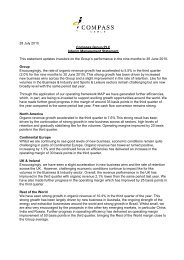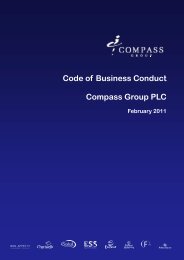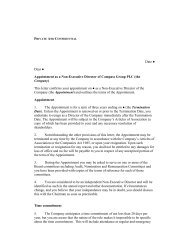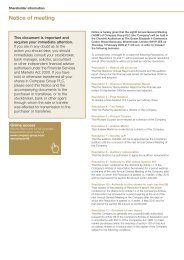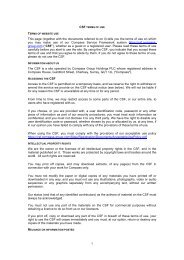2568.11 kb - Compass Group
2568.11 kb - Compass Group
2568.11 kb - Compass Group
Create successful ePaper yourself
Turn your PDF publications into a flip-book with our unique Google optimized e-Paper software.
21 <strong>Compass</strong> <strong>Group</strong> PLC Annual Report 2007Diet and nutritionAs a global foodservice company, werecognise that we have an enormous impacton what our 20 million daily consumerschoose to eat and drink. Our contributionto their diet and nutrition is our mostsignificant impact. Our primary concernis that the food we serve is prepared to thevery highest standards using quality productsand ingredients and, at the very minimum,we comply with all relevant legislation andapproved codes of practice.Initially developed in our UK and USbusinesses, we are progressively implementingduring 2008, a healthy eating frameworkcalled ‘Balanced Choices’, which willform the basis in a minimum standardfor implementation in our ‘Top Ten’.The framework is based on sound science,regulatory requirements and industry bestpractice. To become a registered ‘BalancedChoices’ outlet, the staff must undertake adetailed training programme. In the UK,over 600 units are already qualified to operate‘Balanced Choices’ and in Belgium, ‘BalancedChoices’ has recently been officially endorsedby the Belgian Government. In our USbusiness, almost 1,500 units offer ‘BalancedChoices’ to their customers every day.We are working closely with our customers(and through them with our consumers) aswell as our suppliers, governments andregulators across the globe to respond topublic health issues such as those associatedwith obesity and diet. We aim to provide awide choice of menu items so that consumersseeking healthier options are well served.In the UK, our Education businesses(Scolarest in state schools and Chartwells forthe independent sector) recognise thatteaching children, and increasingly theirparents, about food and getting thementhused about healthy eating is key. Wepromote a whole school approach, supportedby information for parents, extra training forour teams and also encourage pupils to eathealthily with a range of initiatives, includingcooking workshops in schools. All Scolarestschool meals meet the UK Government’sfood-based standards and 60% of primaryschools also meet the more strict nutrientstandards which will be introduced in 2008.Another innovative example of ourcommitment to improving the wellbeing ofchildren, is the ‘BackPack’ programme inAtlantic City, USA which helps ensure thatsome of the neediest children have enoughnutritious food to eat over the weekend.Each Friday, our Chartwells team providebackpacks filled with healthy, non-perishablefood that are collected by the children in theprogramme, providing them with sufficientfood to last the weekend. The children returnthe empty backpacks on Monday morning,so that they can be filled again.Healthy eatingWe support schools, parents and pupils to choosea healthy, balanced diet.Around the world, our consumers arebecoming increasingly mindful andknowledgeable about the nutritional aspectsof what they choose to eat. We are, therefore,using frameworks like ‘Balanced Choices’ toenhance nutritional labelling across our foodproduct range, providing customers withthe information that they need to makeinformed choices.Responsible supply chainThe provenance and origin of the foodwe purchase is a key consideration for us.We require that food is only purchased fromauthorised suppliers and is always preparedunder conditions that do not expose itto the risk of contamination. We expect oursuppliers to comply with the social, ethicaland environmental standards specified inour Vendor Assurance Programme. Acrossour ‘Top Ten’, our suppliers are assessedaccording to risk assessment criteria, to ensurethat they too adhere to our own exactingapproach. We also recognise the benefitsof working closely with them, especially indeveloping markets, to share knowledge andexpertise that will help both organisationsmaintain the standards that our clients andcustomers have come to expect.Increasingly, we work with local producers toimprove their skills and capabilities to helpthem develop new markets and supportthe local community. Our ground-breaking‘Farm to Fork’ programme is one suchexample of working with local producers.This programme, started in 1999 by our BonAppétit team in the USA, set a new standardfor how a foodservice company could supportlocal communities. The Bon Appétit initiativeto purchase from within 150 miles of eachcafé has grown at an unprecedented rate withlocal purchases exceeding US$55 million in 2007.In 2007, we have seen the amount ofFairtrade coffee that we buy increase to 3.4million cups per year across Europe, whichrepresents a 10% increase on last year.EnvironmentA key driver towards our success is the degreeof autonomy which is afforded to localmanagement teams, allowing them to servelocal markets in the most appropriate manner.To support their activities, we have developedan environmental policy supported by aminimum operating standard and a set ofbehaviours that are being introduced into allour operations. The underlying principlesrelating to the environment cover: theintegration of environmental managementinto our business operations to reduce ourknown impacts; the commitment tocompliance with all relevant environmentallegislation and best practice; a commitment tostrive for continual improvement; and acommitment to ensure proper communicationwith, and training for, employees to enablethem to meet our standards. We are aiming,over time, for our behavioural policy to set thebenchmark for our industry.We have set clear environmental objectives inthe following areas to:reduce the water and energy used in ourprincipal office and production units;reduce the CO 2 emissions of ourvehicle fleets;reduce the waste packaging of our supplychain; andseek to reduce food miles by increasing theuse of seasonally available products sourcedfrom the relevant domestic markets.



